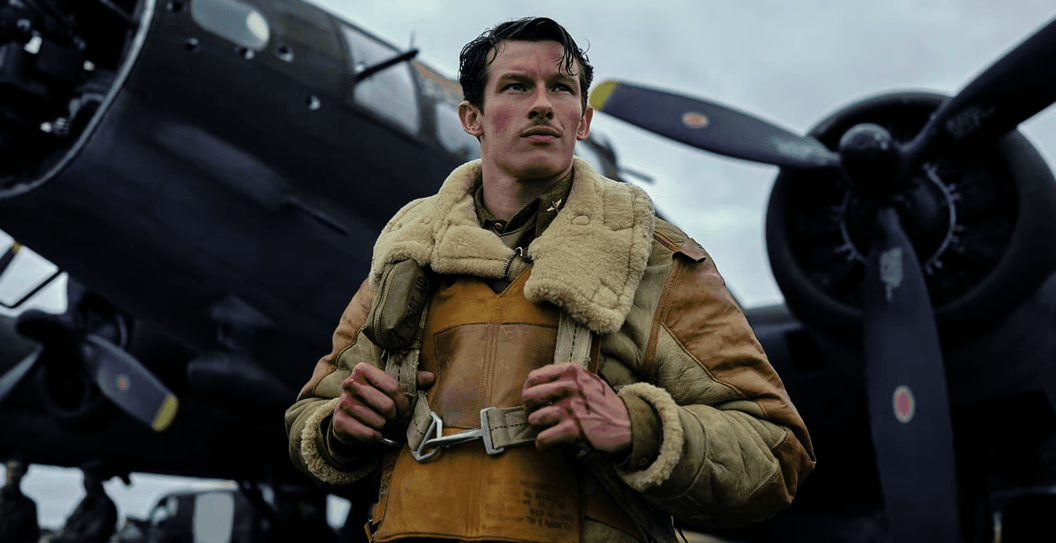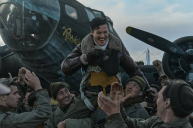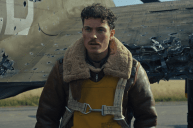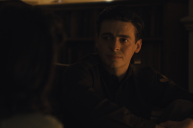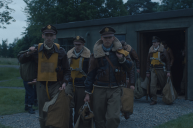Warning, spoilers ahead for episode 3 of 'Masters of the Air'
According to the National WWII Museum website, the Schweinfurt-Regensburg Raid "provided lessons for both sides." Which is an awfully nice way of saying the men of the 3rd and 1st Air Divisions were guinea pigs. Guinea pigs who were shoved into tin cans and hurled through the air into a meat grinder.
Episode 3 of "Masters of the Air" revealed just how experimental the bombing raids carried out by the men of the "Bloody Hundredth" were. And how before the Allies could perfect the bold new strategy of bombing the Nazis into submission, they had to lose a horrifying number of young men.
The third chapter opens with the squadron being briefed on the raid in August 1943. By that time, the Americans were beginning to see the folly in their strategy of daytime bombing missions. While the daylight enabled them to hit precise targets without expending too much payload, it also made them easy to spot by the Luftwaffe. German fighter planes were chewing through B-17s at an alarming rate. To make matters worse, the American bombers were still flying in tight-knit "combat box" formations. Arranging the B-17s in nearly wing-to-wing clusters was supposed to make them less vulnerable: the turrets on each plane would generate so much firepower that their ranks would be impenetrable. At least, that's how it was supposed to work. The US wouldn't realize until later that they were essentially helping the Luftwaffe — they were just lining themselves up to be knocked down.
Eventually, the US would abandon the daytime raids entirely and opt for the English strategy of bombing under cover of darkness, blanketing entire urban areas with bombs and hoping they hit a target of significance. But that was not this day. The US was still determined to make the daytime raids work — and the bomber boys would suffer for it.
Continuing the ill-fated strategy would require them to slow the German production of fighter planes. And so the Schweinfurt-Regensburg Raid was devised: the largest air armada ever assembled. 376 bombers and 240 fighter planes. The 3rd Air Division (which includes our guys in the Hundredth) would pass through heavily guarded German territory first, absorbing the brunt of the Luftwaffe before hitting a German engine factory in Regensburg. 30 minutes later, while the Luftwaffe was back on the ground to refuel, the 1st Air Division would pass through the same air space before heading to Schweinfurt to hit a ball-bearing factory. The 240 P-47 fighter planes would offer additional protection from the Luftwaffe. And diversionary bombing strikes in surrounding areas would spread the German fighter planes as thin as possible.
To top it off, the 1st would fly back to England after dropping their payload. The 3rd would fly on across Europe and land in newly liberated Africa. This would throw the Nazis even further off their tail.
Of course, none of this played out how they hoped.
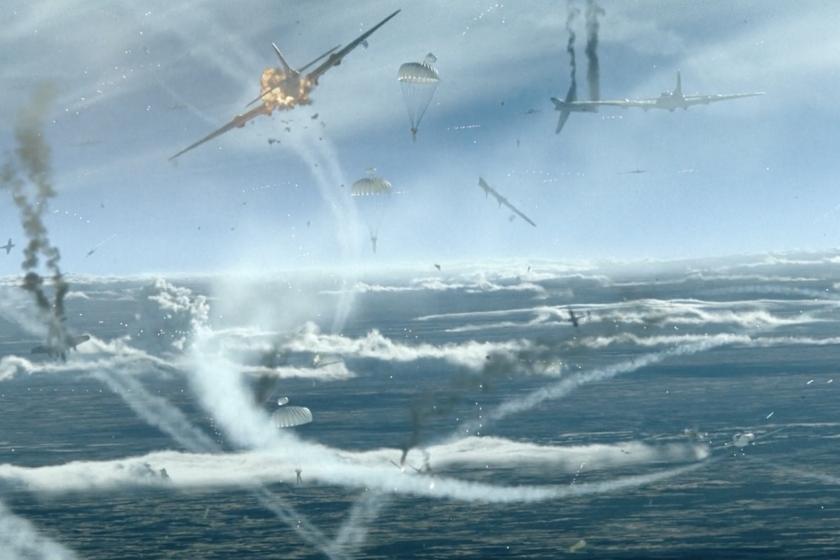
Apple TV+
A thick fog hangs forebodingly over the runway as the boys of the 100th pile onto their planes. A priest offers last rites. Some of the men are painfully aware of how fragile the so-called Flying Fortresses truly are. Others, not so much. Baby Face is wondering why they don't just take off — can't the pilots handle a little fog? Quinn (Kai Alexander) replies that sure, they can fly in fog, but if there's a cow on the runway, they'd crumple like an accordion.
"We're in a Flying Fortress," Baby Face retorts. "We can take on a cow."
"Alice isn't a Buick, Baby Face," Quinn says (they named their boat "Alice From Dallas"). "She's a tin can."
Baby Face seems unconvinced, and his belief in the structural integrity of the bomber will prove heart-wrenchingly ironic later on.
After some delay, Colonel Curtis LeMay gives the order: the 3rd are to take off immediately, fog or no fog. The 3rd ascends into the hazy skies, but the 1st won't be joining them. While the 3rd was well-practiced in flying through foggy conditions, the 1st was not. Nor were the bomber divisions tasked with diversionary strikes. Most of the P-47s would also get lost in the weather.
Instead of the world's largest armada ever assembled, the 3rd is sent deep into German territory all by their lonesome — and the Hundredth are at the extra-unprotected rear. As Colonel Neil "Chick" Harding puts it: "We are sending them straight into hell."
The brass had emphasized that coordination and timing were paramount to the success of the mission. So it's puzzling why LeMay ordered the 3rd to go on by themselves. My research into the mission didn't offer any definitive answers. Perhaps he thought the fog would lift sooner. Perhaps a reckless abandon for the lives of the airmen was in his nature (LeMay was known for his aggressive tactics and would go on to advocate for nuking North Korea during the Korean War). But as it happened, the 1st wouldn't take flight until 3 hours later, which gave the Luftwaffe plenty of time to land, refuel and hit both divisions in full force.
The results were devastating, and "Masters" shows them in great detail. The agile German fighter planes pounce on the lumbering B-17s, isolating them and tearing into their metal hides like a pack of hyenas on an elephant.
A sweeping shot shows the blue skies filled with falling planes and bodies. Major Gale Cleven (Austin Butler) watches an airman tumble through the air and hit his wing, ripping his body in half and painting the wing in blood.
The boat piloted by Roy Frank Claytor (Sawyer Spielberg) is going down. And as the men are parachuting out, Quinn hears howling from the ball turret. The hatch is broken — and Baby Face is trapped inside. In an agonizing sequence, Quinn tries desperately to pull the hatch open. But it's no use. The plane is burning up, and Quinn can do nothing but apologize to the squealing Baby Face. Quinn jumps out of the plane a second before it explodes.
We also lose Lt. Curtis Biddick (Barry Keoghan), one of the main subjects of the series thus far. Their plane is also going down and his copilot is shot and unable to move. As the men bail out, pleading with Biddick to leave the doomed copilot behind, Biddick heroically insists on staying to land the plane. The boat stalls on the descent and explodes on impact.
Quinn lands his parachute in Belgium, where he meets a civilian militia fighting against the Nazis. A man in the militia tells him he can surrender to the Nazis, where he'll become a POW under the Gonoeva Convention and likely survive the war. Or, he can attempt to escape back to England, and if he's caught, he'll likely be treated as a spy and executed. Quinn doesn't make his choice before the episode ends, but I have a feeling he'll choose the latter option, which will depict a whole new flavor of the war in the coming episodes.
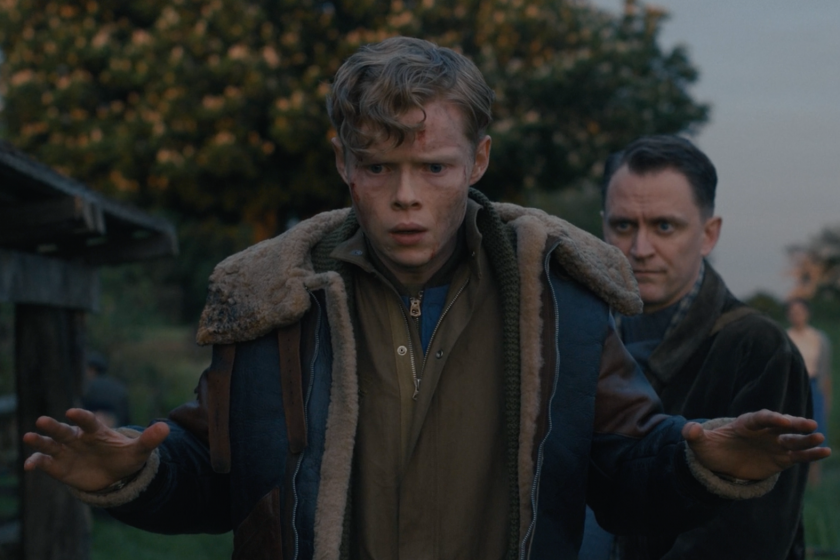
Apple TV+
All told, only 11 of the 21 planes from the Hundredth make it to Africa.
History books tell us that ultimately, their sacrifice during the Schweinfurt-Regensburg Raid was all for naught. The Germans simply scattered their production across rural areas and underground factories and ramped up the slave labor in concentration camps. They continued to run at peak efficiency until near the end of the war.
In the closing scene, Major John Egan (Callum Turner) tries to remain optimistic about the fates of the men who went down, but Cleven is visibly traumatized.
"We're gonna get through this," Egan says. "Come on, don't you stop believing that."
All Cleven can muster in response: "Sure, Bucky," as sorrowful string music carries us into the credits.
The mission resulted in a crushing loss of life for the hard-luck "Bloody Hundredth." This episode managed to portray the heroics of the men without glorifying their suffering or downplaying the carelessness of the brass who sent them to die. Another brutal, powerful chapter from the WWII epic that has so far lived up to its companion series "Band of Brothers" and "The Pacific."
Watch "Masters of the Air" Fridays on Apple TV+.
